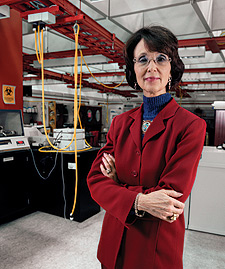What do YouT ube co-founder Steve Chen, pioneering software engineers Rob and Mike McCool, and a gifted young scientist named Cindy Wang have in common? They attended the Illinois Mathematics and Science Academy, an elite residential high school in Aurora. Since its creation in 1985, IMSA has been headed by Stephanie Pace Marshall, a nationally recognized consultant, speaker, and writer about education issues. Chicago talked to Marshall, 61, who spoke by phone from her home in Wheaton, about her school’s high-profile progeny, the dangers of standardization, and why her pending retirement doesn’t mean slowing down.
|
Photograph: Selena Salfen |
|
Stephanie Pace Marshall
|
Q: Several IMSA alumni have been in the news lately, including Cindy Wang, who isolated a gene causing colorblindness in mice while still a senior at IMSA. What about IMSA incubates such early success?
A: Our kids are just doing amazing work. The most gratifying is that they really do bring a sense with them of making the world a better place. You could have kids that are just focused on careers and just out to make it big, but there is a humility to them that I think is enormously impressive.
Q: IMSA doesn’t work for everybody. Steve Chen, for example, transferred out of IMSA to his home district of Arlington Heights for his senior year.
A: I can’t speak to whether or not IMSA works [for all kids]. I can tell you some patterns of why kids choose to leave. They leave because of homesickness. They leave because of parents saying, “I miss you terribly.” They leave because it may not be what they thought it would be. I had a student say several years ago, “I want to be valedictorian.” I told him, “You can’t be that here” [because IMSA does not calculate class rank]. So he went back to his home high school, and he was valedictorian. These kinds of kids have excelled at schooling. They have not necessarily excelled at learning.
Q: IMSA has been very successful in its 20 years, turning out more than 3,000 graduates. What do you see as challenges going forward?
A: Talent identification is always a challenge because there is not a neat and simple way to do it. Right now as a country we have narrow ways: standardized tests, the SAT in math. We have a portfolio of indicators for academic success. We know, unfortunately, that the greatest indicator is ZIP Code. Where kids live. It’s so totally connected to poverty. As a country we have to address that. That will be a challenge for IMSA.
Q: IMSA is funded in large part by the State of Illinois. What has been the advantage of public-school status?
A: It puts us into the spotlight. It makes us accountable. It ratchets up the expectations. It levels the playing field in very
significant ways. You could live in East St. Louis, or in the environment around Cabrini-Green, or New Trier-wherever. Your ability to attend IMSA is not dependent on your financial situation. It’s dependent on your potential and talent in math and science.
Q: But there are certainly disadvantages.
A: When the budget cuts in Illinois come, they come to IMSA. We are around 75 to 77 percent dependent on appropriations from the Illinois General Assembly. The universities have been significantly hit by state budget constraints, but they can raise tuition, they can get research grants . . . we’re not able to do that.
Q: Now that you’re retiring, what happens next?
A: When you use the word “retiring” people assume you’re going out to pasture and playing golf. I’m stepping down and moving on to other work I feel I need to do now. [Marshall will continue to write, lecture, and consult on educational issues.] I’ve been focused all of my professional life on trying to transform the current [educational] conditions and create something profoundly different. What I say is that we have to immerse children in meaning, not memory. Ensure that learning is all about engagement and not transmission. I don’t know where it is that we seem to get away from the idea that school is all about thinking.



